Have you ever wondered why people hesitate to buy something if there are no customer reviews? Did you even know that reviews older than three months might not be relevant for many customers? Yes, that’s true. In fact, a significant 92% of customers read at least two reviews before making a purchasing decision. That’s why mastering business reputation management (BRM) is not just a smart move – it’s a requisite for your company’s success.
Remember, in today’s tech-savvy world, just one review can make or break your business.
In this blog, we will explore the world of reputation management for businesses. We’ll talk about why a good reputation is important, and how you can take care of yours effectively.
Table of contents
- What is business reputation management?
- Why online business reputation matters
- Strategies for online business reputation management
- Best practices in business reputation management
- Benefits of effective business reputation management
- Developing a business reputation management plan
- Measuring the success of your business reputation management efforts
- Top software tools for business reputation management
- Emerging trends in business reputation management
- FAQs about business reputation management
- Elevate your business reputation management game with Birdeye
What is business reputation management?
Business reputation management is the process of shaping and influencing the way the public sees your business. It’s not just about fixing problems when they pop up; it’s more about actively building a positive image for your company.
Unlike brand reputation, which focuses on a single brand, business reputation management includes everything from the quality of your services to how you treat your customers and even the values your company stands for.
Why online business reputation matters
Online business reputation matters because it’s a major deciding factor for customers in the digital age. For those businesses in specific sectors like real estate, managing online reputation takes on unique challenges and opportunities. Explore more on this in our detailed blog about real estate reputation management.
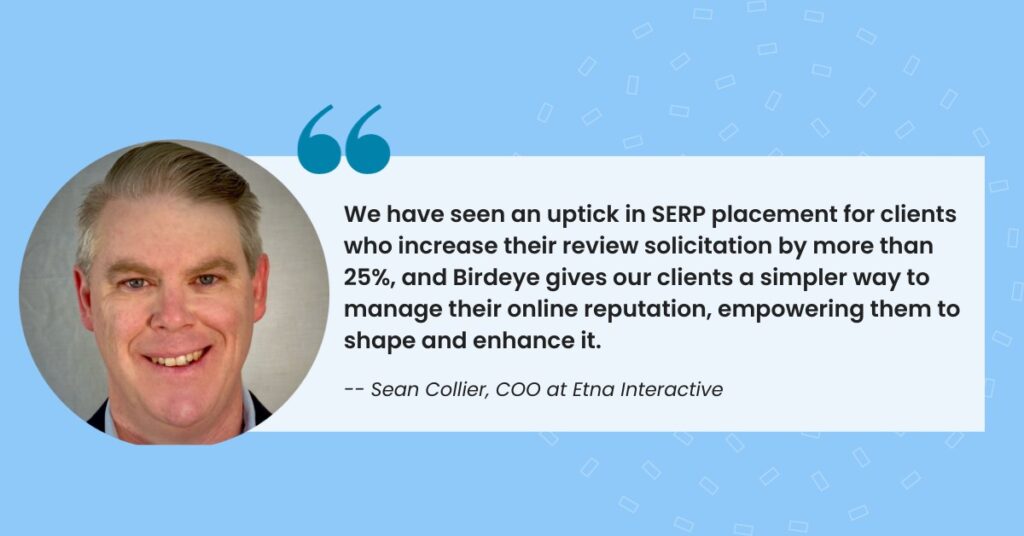
According to a Birdeye study, 95% of people read online reviews before buying anything. For example, a local cafe can become the town’s talk with great reviews about its top-notch service. Therefore, positive feedback on the internet, including customer testimonials and word-of-mouth endorsements, can significantly elevate a business’s profile and attract more customers.
Strategies for online business reputation management
Managing your online reputation combines several strategies. These include checking online reviews, staying active on social media, and ensuring your business information is correct everywhere online. Here’s a closer look at each of these strategies:
1. Managing online reviews
A good review can bring in new customers, while a bad one might turn them away. It’s important to regularly check sites like Birdeye and Google Business Profile (previously known as Google My Business) for new reviews, respond to them promptly, and encourage happy customers to share their experiences. Remember, every review is a chance to show great customer service and fix any mistakes.
2. Maintaining a strong social media presence
Social media is a great place to talk with your audience, share interesting content, and build your brand’s image. The trick is to be consistent in how often you post and talk to your customers.
You must post regularly on social media platforms to keep people interested and show that you care about their thoughts and feedback.

3. Ensuring accurate business listings
Wrong information in your business listings can frustrate customers and make you miss out on business. Make sure your business details, including your name, address, phone number, and operating hours, are the same across all online directories and platforms.
Regular updates are essential, especially if you change anything about your business. Think of your online listing as your digital front door – it should be inviting and accurate.
4. Engaging with customers online
Talking to customers online is more than just replying to comments. It’s about being part of the conversation, understanding customers’ needs, and offering help. Sharing tips and industry insights or joining discussions shows you care.
Quick replies to questions or concerns also show that you’re dedicated to providing excellent customer service. When you treat your customers as individuals, it really strengthens their trust and loyalty to your brand.
In industries like healthcare, where trust is everything, a well-managed customer relationship significantly impacts business performance. If you’re curious to dig deeper, check out our blog on healthcare reputation management for some really insightful stuff.
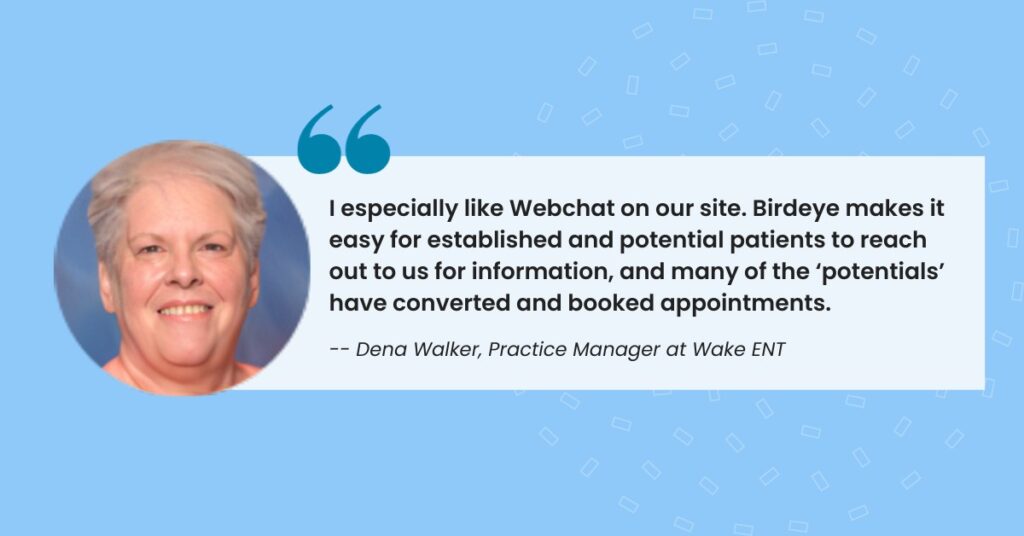
5. Addressing feedback promptly and professionally
Dealing with customer feedback, especially the not-so-good ones, is a delicate but crucial part of reputation management. You should consider it as an opportunity to turn a bad experience into a good one. Saying sorry for mistakes and offering solutions or compensation can help smooth things.
Sometimes, it’s better to take these conversations off public platforms and continue them through email or direct messages. The main goal here is to show that you’re quick to respond and committed to making your customers happy.
Best practices in business reputation management
Want to know how to shine in your business reputation management efforts? Here are some best practices you should know about:
1. Stay on top of your online presence
Keep an eye on what people are saying about your business online. You can do it by regularly checking social media, review sites, and search engine results. It’s like having your ear to the ground; you want to know about the buzz around your business – whether it’s a glowing review or a customer complaint – as soon as it happens.
2. Respond quickly to feedback
Fast responses to feedback show that you value your customers’ opinions and needs. And we’re not just talking about the good comments; addressing negative feedback in a constructive way is equally important.
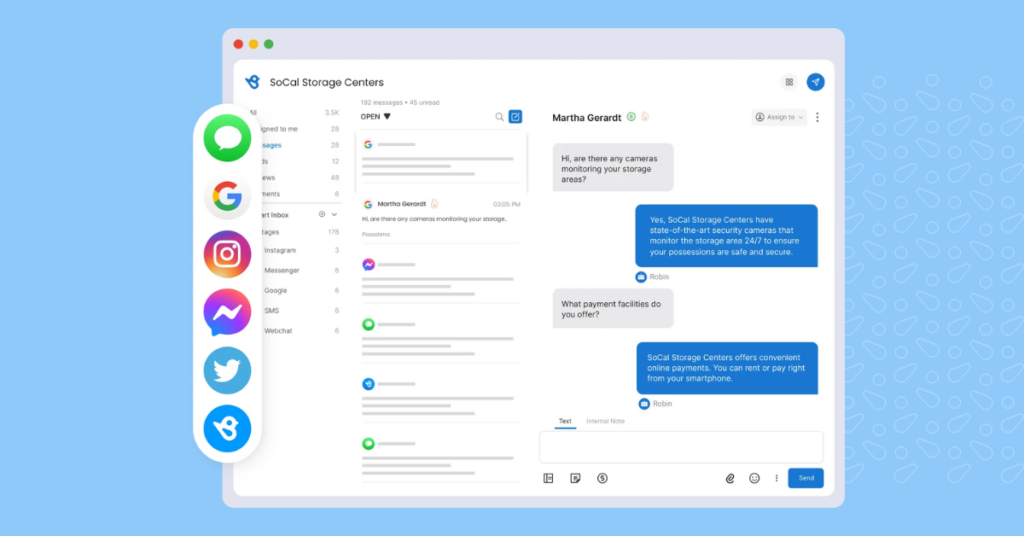
3. Keep your online information up-to-date
It’s crucial to make sure all your online details are updated. This includes your contact information, business hours, and the services you offer. Outdated or wrong info can frustrate customers and make you lose business opportunities.
4. Encourage customers to leave reviews
Positive reviews are like assets for your business. That’s why you should encourage your happy customers to share their good experiences online. This can be through emails after a purchase, signs in your store, or just a friendly verbal reminder.
5. Be active on social media and online forums
Participating actively on social media and relevant online forums can really boost your business’s reputation. Focus on sharing content that adds value, joining discussions, and building a community around your brand. This gets your name out there and creates a connection with your target audience.
Benefits of effective business reputation management
A solid online reputation management can be a real game-changer for your business. Here are the benefits that make all the difference:
1. Increased customer trust
When people see that you’re actively taking care of your online reputation, they trust you more. A well-managed reputation often means you’re seen as reliable and caring about your customers.
2. Higher revenue
Businesses with strong online reputations are likely to attract more customers, leading to increased sales. Studies have shown that customer reviews can produce an average increase in sales revenue of about 18%. This highlights the powerful impact a positive online presence can have on a business’s bottom line.
3. Improved brand image
Taking care of your reputation can really make your brand shine. When people consistently see positive things about your business, they’ll have a good image of your brand in their minds. For example, online reputation management in the financial services industry impacts consumer confidence directly.

4. Competitive advantage
In a crowded market, having a strong reputation can be the deciding factor for customers. Businesses with better reputations often stand out and attract more customers.
5. Enhanced online visibility
A good reputation can also mean better visibility online. High ratings and positive reviews often lead to higher rankings in search engine results, making it easier for potential customers to find you.
6. Customer insights and feedback
Managing your reputation gives you valuable insights into what your customers like and what you can do better. This feedback is key to improving your products, services, and the overall customer experience.
Developing a business reputation management plan
Creating a well-thought-out BRM plan is essential. Here’s how you can get started to craft a killer enterprise reputation management strategy:
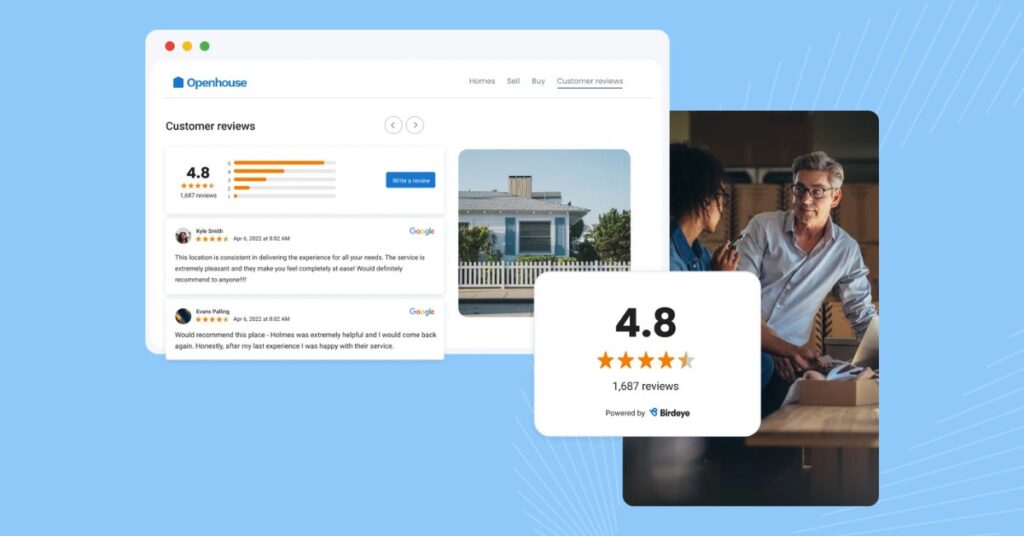
1. Assess your current online reputation
Begin by looking at what’s currently being said about your business online. This includes checking out reviews, social media mentions, and even news articles.
2. Set clear reputation objectives
Decide on specific, achievable goals for your reputation management. This might be improving your review ratings or getting more positive interactions on social media.
3. Develop a proactive strategy
Put together a plan that includes regularly updating your social media, engaging with customers, and encouraging positive reviews. The aim is to build a solid online presence that can handle the occasional negative comment.
4. Create a reactive plan for negative feedback
Have a strategy ready for dealing with negative feedback and crises. This should include responding to bad reviews and comments professionally and constructively.
5. Implement monitoring tools and processes
Use digital tools to keep a constant eye on your online reputation. This can be setting up alerts for your business name or using social media monitoring tools.
6. Regularly review and adapt your strategy
Your reputation management plan should be flexible. Regularly check how well your strategies are working and be ready to make changes when needed.
Retail businesses, with their direct consumer interaction, can particularly benefit from a structured approach. Delve into this further in our retail reputation management blog post.
Manage online reputation with Birdeye
Automate Reviews, Ratings, Listings & Reputation Management with Birdeye.
Measuring the success of your business reputation management efforts
Knowing if your online business reputation management strategies are working is key. Here are some ways to measure success:
1. Tracking customer feedback and reviews
Keep an eye on the number and quality of customer reviews. More positive feedback usually means your reputation is in good shape.
2. Analyzing brand loyalty metrics
Look at how often customers come back or renew subscriptions. Loyal customers, who return repeatedly, are a sign of a strong reputation.
3. Evaluating social media engagement
Check how people interact with your social media posts, including likes, shares, and comments. More engagement typically means a better reputation.

4. Monitoring sales and revenue trends
See if there’s a link between your reputation efforts and your sales. An uptick in sales can be an indicator that your reputation is solid.
5. Conducting surveys and using customer feedback forms
You can gauge direct customer sentiment about your business by conducting customer surveys or using feedback forms. Ask your customers directly how they feel about your product or service. This can give you some of the best customer insights into your reputation.
6. Analyzing search engine rankings
Keep an eye on where you rank in search results for important keywords. Higher rankings can be a result of positive reviews and an improved online reputation.
7. Reviewing website traffic analytics
Look at your website traffic, especially from review sites and social media. More traffic can mean your reputation management is working well.
Top software tools for business reputation management
Looking for the best reputation management software for your business? Here are a few tools to aid in monitoring your multi-location business reputation management strategy.
1. Birdeye
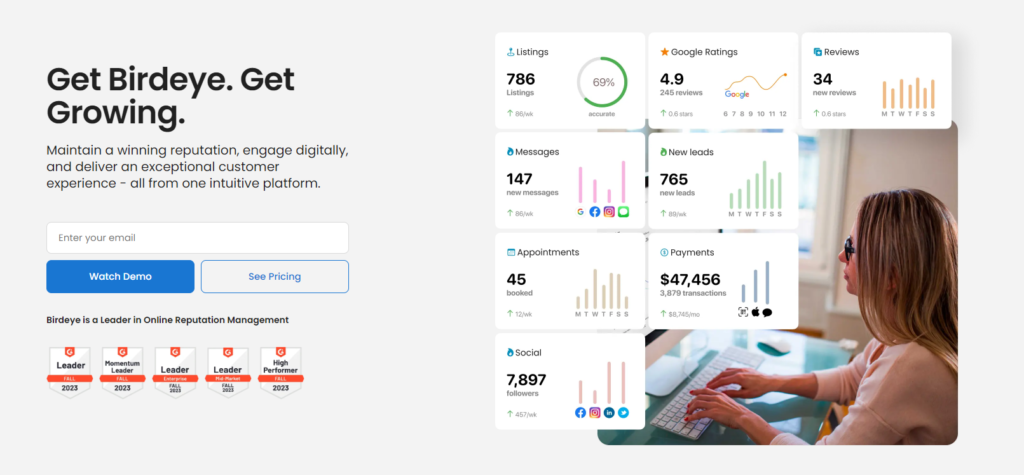
Birdeye is an all-in-one online business reputation management platform that helps enterprises collect and manage reviews, interact with customers through various channels, and analyze customer feedback. Its comprehensive suite of tools includes review monitoring, survey creation, advanced reporting, and listing management, making it a versatile choice for businesses of all sizes.
2. Yext

Yext specializes in managing online listings and ensuring business information consistency across multiple platforms. It’s handy for businesses with multiple locations, as it simplifies the process of updating and maintaining accurate business information across various directories and review sites.
3. ReviewTrackers
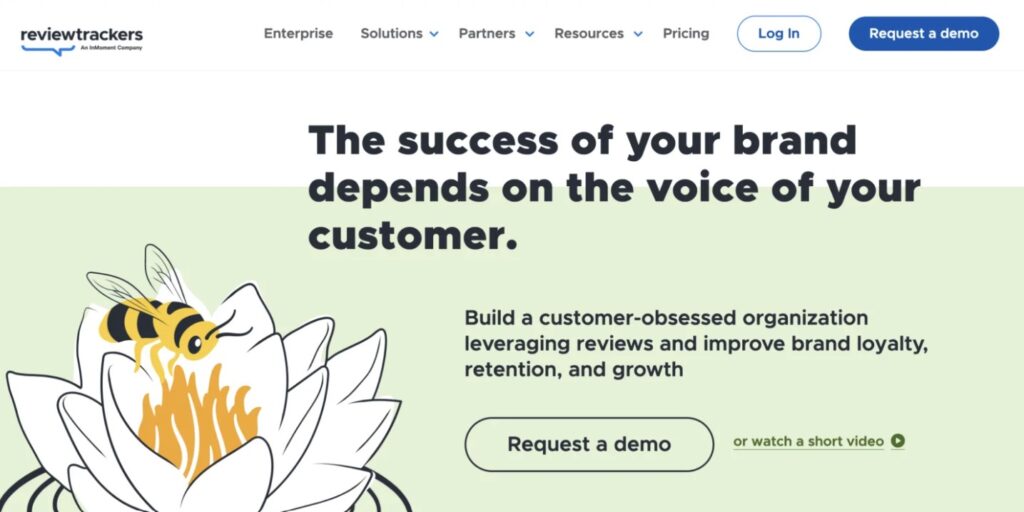
ReviewTrackers focuses on monitoring and analyzing online reviews. It gives businesses insights into customer sentiment and trends, helping them understand their audience better. The platform also aids in gathering and responding to reviews from various sources in one centralized location.
4. Hootsuite

Hootsuite is predominantly a social media management tool that also plays a significant role in reputation management. It allows businesses to schedule posts, engage with their audience, and monitor social media for brand mentions, providing a comprehensive view of their social media presence.
5. SEMrush
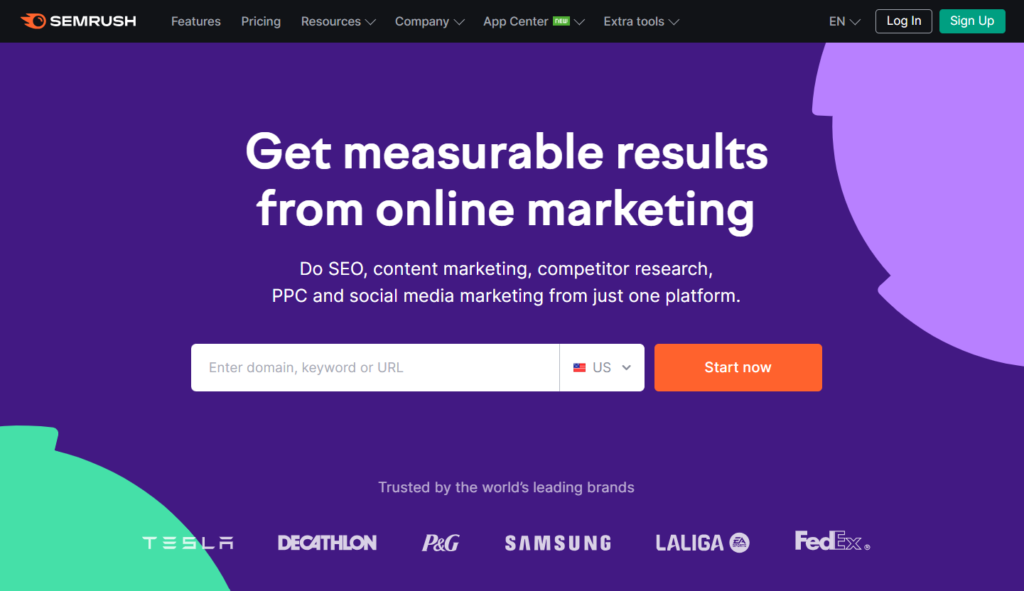
While primarily an SEO tool, SEMrush offers features beneficial for reputation management, such as brand monitoring and social media tracking. It helps businesses keep an eye on their online presence and understand how they rank in search engine results, which is crucial for managing their reputation.
6. Reputation.com
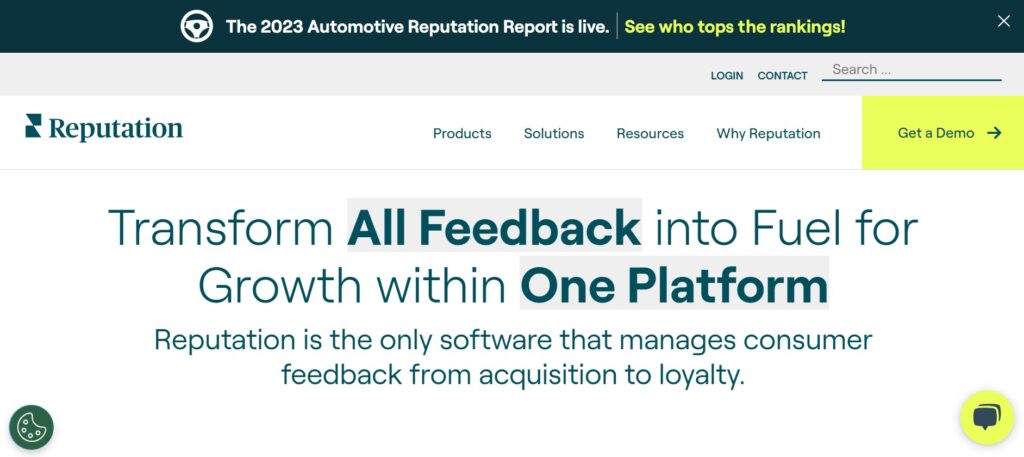
Reputation.com offers tools for managing online reviews, social media, and customer surveys. It provides detailed analytics to help businesses understand their online reputation and offers strategies to improve it. The platform also assists in managing local search visibility.
7. Trustpilot

Trustpilot is a consumer review website offering tools for businesses to collect and manage reviews. It’s a platform that allows customers to leave feedback directly, helping businesses build trust and transparency with potential customers. Trustpilot also provides analytics to understand customer sentiment and trends.
8. Sprout Social
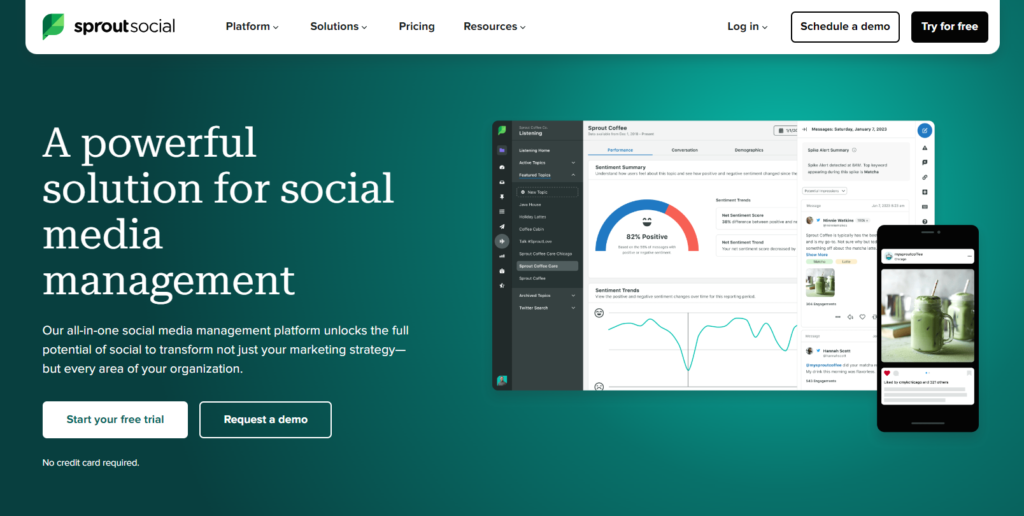
Sprout Social is an advanced social media management tool that is essential for reputation management. It allows businesses to manage and schedule content across multiple social media platforms, engage with their audience, and gain valuable insights through social listening and analytics. This tool helps understand audience sentiment and maintain a positive social media presence, which is crucial for a good reputation.
Emerging trends in business reputation management
The world of reputation management for businesses is constantly evolving, adapting to new technologies and changing consumer behaviors. Staying ahead in this dynamic field means being aware of the latest trends and strategies.
Here are some emerging trends that can help you transform your business reputation management strategy:
1. Artificial Intelligence (AI) in online business reputation management
AI is changing how businesses manage their reputations online, from automating review responses to analyzing customer sentiment. For example, Birdeye’s ‘BirdAI‘ leverages AI to automate review requests and responses and helps in sentiment analysis. This technology streamlines business reputation management and provides more accurate, real-time insights into what customers are saying and feeling.

2. User-generated content (UGC)
UGC, like customer reviews and social media posts, is increasingly important in shaping a business’s reputation. This is because customers often view UGC as more authentic and trustworthy compared to traditional marketing content.
3. Integration with other business functions
More businesses are combining BRM with other areas like marketing and customer service for a more unified approach. It allows companies to ensure a more cohesive approach to building and maintaining a positive reputation.
4. Personalization
Businesses are using data analytics and AI to tailor their reputation management efforts to individual customers. This personalization helps create a more engaging and satisfying customer experience, resulting in an improved reputation for your business.
5. Proactive reputation management
Instead of just reacting to problems, businesses are actively shaping their online presence to prevent issues before they arise. It’s an excellent way for businesses to maintain a consistently positive image among their customers.
6. Employee advocacy
In addition to managing online reviews, encouraging employees to share positive aspects of their work and company culture on social media can also significantly impact the business’s reputation.
7. Leveraging data analytics
Data analytics is becoming crucial to reputation management, helping businesses understand customer behavior and preferences. These insights help businesses make informed strategic decisions and fine-tune reputation management tactics for better results.
In today’s online world, taking care of your business’s reputation is a must-have strategy for survival. From leveraging AI like BirdAI to harnessing the power of user-generated content, BRM is changing fast. Beyond merely fixing problems or damping down negative comments, it’s essentially about telling your business’s story in a way that clicks with people and shows off the best of what you do and believe in.
FAQs about business reputation management
Business reputation management is the practice of monitoring and influencing the perception of a business in the online and offline world. It involves strategies to handle feedback, promote positive reviews, and mitigate the impact of negative sentiment.
The four components of reputation management typically include monitoring your reputation, responding to both positive and negative feedback, repairing any damage from negative incidents, and building a strong, positive online presence.
The primary objectives of reputation management are to establish and maintain a positive brand image, to increase trust among consumers, and to manage and mitigate the effects of negative content. It’s also focused on promoting brand values and increasing engagement with the customer base.
Reputation can be measured through various metrics such as customer feedback scores, review ratings, social media sentiment analysis, brand mentions, the volume of positive vs. negative press, and customer loyalty indicators like repeat purchases or retention rates.
Elevate your business reputation management game with Birdeye
Birdeye is like a guiding light for enterprises navigating the tricky world of online reputation. It simplifies everything – from gathering and responding to customer reviews to handling feedback from all sorts of places in one neat package.
Birdeye’s smart analytics and reporting capabilities give you a clear picture of what your customers are thinking and feeling. And, this is way beyond just keeping an eye on your reputation; it’s about understanding and shaping it to help your business grow in the long run.
Ready to transform your business reputation management strategy? Watch a demo today to know how Birdeye can pull this off.

Originally published









